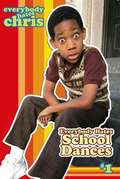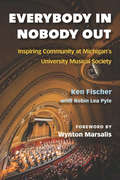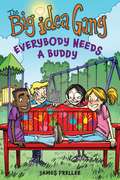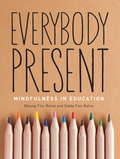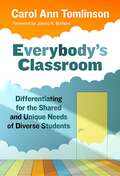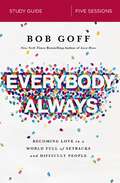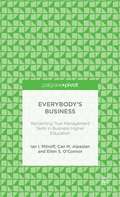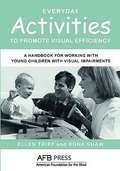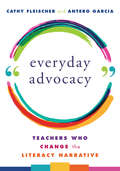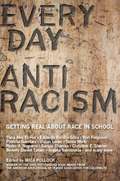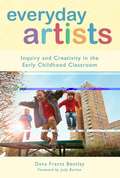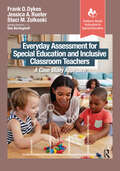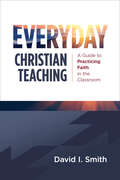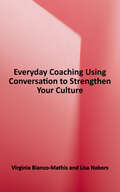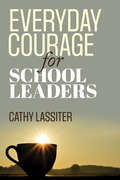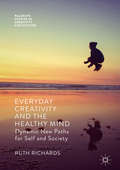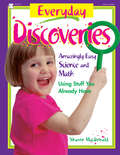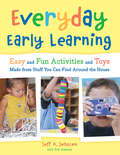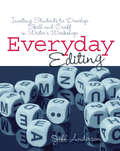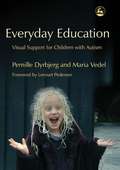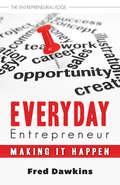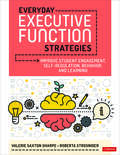- Table View
- List View
Everybody Hates School Dances
by Brian JamesFed up with being teased by the school bully, Chris blurts out that he's going to the school dance on Friday with the prettiest girl in Bed-Stuy -- and that he's taking her in a limousine! Word travels fast, and soon Chris has only four days to find a date and a limousine, or he'll be the laughingstock of Corleone Jr. High. As if that wasn't bad enough, he somehow lets it slip that he is the best break-dancer in all of Brooklyn -- and all the kids at school want to see him prove it on the dance floor. Can Chris get out of this mess without getting caught or beaten up? Probably not, but he's going to try!
Everybody In, Nobody Out: Inspiring Community at Michigan's University Musical Society
by Ken FischerHoused on the campus of the University of Michigan in Ann Arbor, the University Musical Society is one of the oldest performing arts presenters in the country. A past recipient of the National Medal of Arts, the nation’s highest public artistic honor, UMS connects audiences with wide-ranging performances in music, dance, and theater each season.Between 1987 and 2017, UMS was led by Ken Fischer, who over three decades pursued an ambitious campaign to expand and diversify the organization’s programming and audiences—initiatives inspired by Fischer’s overarching philosophy toward promoting the arts, “Everybody In, Nobody Out.” The approach not only deepened UMS’s engagement with the university and southeast Michigan communities, it led to exemplary partnerships with distinguished artists across the world. Under Fischer’s leadership, UMS hosted numerous breakthrough performances, including the Vienna Philharmonic’s final tour with Leonard Bernstein, appearances by then relatively unknown opera singer Cecilia Bartoli, a multiyear partnership with the Royal Shakespeare Company, and artists as diverse as Yo-Yo Ma, Jawole Willa Jo Zollar, Elizabeth Streb, and Nusrat Fateh Ali Khan. Though peppered with colorful anecdotes of how these successes came to be, this book is neither a history of UMS nor a memoir of Fischer’s significant accomplishments with the organization. Rather it is a reflection on the power of the performing arts to engage and enrich communities—not by handing down cultural enrichment from on high, but by meeting communities where they live and helping them preserve cultural heritage, incubate talent, and find ways to make community voices heard.
Everybody Needs a Buddy (The Big Idea Gang)
by James PrellerThe Big Idea Gang is buddying up on a new idea for a more welcoming playground in this chapter book series about making a case—and making a difference. When third-graders Deon, Kym, Lizzy, and Connor formed the Big Idea Gang, their mission was simply to oust the old mascot in favor of something cooler. But sales from the new mascot paraphernalia have led to extra cash for the PTA, and you can bet this gang has big ideas about how to spend it. A playground pirate ship! An author visit! New basketball hoops! There are lots of ways they can think of to improve their school; but what about a way to make it a kinder, more inclusive place? Luckily, their teacher, Miss Zips, is skilled in the art of persuasion. Armed with Miss Zips's persuasive tips, the Big Idea Gang sets out to build a case for a new-and-improved Clay Elementary, and convince the rest of the school that their idea is the best.
Everybody Present
by Nikolaj Flor Rotne Didde Flor RotneEverybody Present seeks to create a new kind of culture in our schools: one that counters stress and facilitates learning. It reframes the student-teacher relationship, showing teachers how to supplant antagonism and foster strong relationships by planting seeds of mindfulness in their students and encouraging them to embark on a mindfulness practice of their own.Illustrating the transformative effects of mindfulness on educators, students, and their classrooms, Everybody Present shows how mindfulness helps to strengthen inner peace and prevent stress, foster contagious joy and an ethic of altruism, improve understanding between student and teacher, and fortify competence in educational relations.A working manual addressed to everyone in the educational universe, Everybody Present presents real-world applications grounded in solid research. Stories, exercises, and case studies demonstrate the effectiveness of mindful practices across all areas of education.Everybody Present is intended to contribute to the creation of a culture throughout the educational system writ large, working against stress and victim mentality to set in motion a revolution of silence, allowing each individual the experience of inter-being, inner calm, and joy. By exploring the challenges of teaching, Everybody Present will help all educators transform feelings of inadequacy into experiences of abundance.
Everybody Present: Mindfulness in Education
by Nikolaj Flor Rotne Didde Flor RotneEverybody Present illustrates the transformative effects of mindfulness on educators, students, and their classrooms. Using concrete examples, Didde and Nikolaj Flor Rotne present a mode of classroom engagement that reduces stress to make room for thoughtful learning. A working manual addressed to everyone in the educational universe, Everybody Present presents real-world applications grounded in solid research. Stories, exercises, and case studies demonstrate the effectiveness of mindful practices across all areas of education. By exploring the challenges of teaching, Everybody Present will help all educators transform feelings of inadequacy into experiences of abundance. Everybody Present seeks to create a new kind of culture in our schools: one that counters stress and facilitates learning. It reframes the student-teacher relationship, showing teachers how to supplant antagonism and foster strong relationships by planting seeds of mindfulness in their students and encouraging them to embark on a mindfulness practice of their own. Everybody Present is intended to contribute to the creation of a culture throughout the educational system writ large, working against stress and victim mentality to set in motion a revolution of silence, allowing each individual the experience of inter-being, inner calm, and joy.
Everybody's Classroom: Differentiating for the Shared and Unique Needs of Diverse Students
by Carol Ann TomlinsonMost people are keenly aware that every student is different and that today's classrooms challenge educators to build safe and successful learning communities comprising students whose races, languages, cultures, experiences, assets, and dreams vary greatly. This book offers K-12 teachers both the foundations for differentiating their instruction and the means to maximize learning opportunities by getting to know students beyond the labels and stereotypes that often accompany them into the classroom. Tomlinson shows how to use "highways and exit ramps" to reach the whole class, with "highway" content and "exit ramps" to specialize needs. Chapters offer numerous recommendations for modifying environments, activities, and assessments; for helping teachers move forward in their instructional planning; and for helping each learner grow academically. Everybody's Classroom extends Tomlinson's previous work by looking more deeply at specific student populations to help educators create classrooms that are more inclusive than ever before. Chapters cover successful differentiation for English learners; students experiencing poverty; students with different ethnic, cultural, religious, and gender orientations; and students with diverse identified special needs. Book Features: - Provides a framework for understanding the scope of differentiation, as opposed to seeing it as a prescribed set of instructional strategies. - Shows how to recognize common student needs that cut across student labels, from gifted to traumatized. - Offers suggestions for teacher actions based on observation of students and student work. - Includes classroom examples and helpful tables, charts, and graphics.
Everybody, Always Study Guide: Becoming Love in a World Full of Setbacks and Difficult People
by Bob GoffIn this five-session video Bible study (DVD/download sold separately), bestselling author Bob Goff shares some of the stories from his life that have helped him understand what it truly means to love everybody the way Jesus loved them–without fear, insecurity, or restriction. This begins by loving people right where you are through serving and helping the neighbors God has placed into your world. It means loving people when they mess up and helping them move past the place of shame to acceptance. It continues by being courageous and following where God leads one step at a time–even if you fell you are flying blind. Above all, it means not just agreeing with Jesus but actually stepping out and doing what Jesus said.Following Christ means more than just putting a toe in the water when it comes to loving others. It means grabbing your knees and doing a cannonball! And, as Jesus revealed, it means loving the difficult ones. Everybody, Always will provide practical steps to help you take that journey.The Everybody, Always Study Guide includes video discussion questions, Bible exploration, and personal study and reflection materials for in-between sessions.Sessions include:Love People Where You AreCatch People on the BounceDon’t Play It SafeLook at What’s in Your BucketLove Even the Difficult PeopleDesigned for use with the Everybody, Always Video Study (9780310095361), sold separately.
Everybody’s Business: Reclaiming True Management Skills in Business Higher Education
by Can M. Alpaslan Ian I. Mitroff Ellen S. O’connorEverybody's Business is a succinct analysis of the factors that led to the founding of American business schools and why they are the way they are. Mitroff, Alpaslan, and O'Connor consider why current business schools do not give students the knowledge and the tools they need to deal with today's complex, messy problems and systems.
Everyday Activities to Promote Visual Efficiency: A Handbook for Working with Young Children with Visual Impairments
by Rona Shaw Ellen TriefEarly intervention services are essential for infants and toddlers who are visually impaired and have some functional vision that they will be able to use for everyday activities--not only to ensure their early development but also to help them learn to use their vision with maximum effectiveness, right from the start. Everyday Activities to Promote Visual Efficiency offers guiding principles for early intervention with very young children who are visually impaired and who may also have additional disabilities. This important new resource provides simple activities that can be incorporated easily by families and service providers into the everyday routines of a baby or child to facilitate early visual development and use of functional vision.
Everyday Advocacy: Teachers Who Change The Literacy Narrative
by Cathy Fleischer Antero GarciaWhat counts as professionalism for teachers today? Once, teachers who knew their content area and knew how to teach it were respected as professionals. Now there is an additional type of competency required: in addition to content and pedagogical knowledge, educators need advocacy skills. In this groundbreaking collection, literacy educators describe how they are redefining what it means to be a teaching professional. Teachers share how they are trying to change the conversation surrounding literacy and literacy instruction by explaining to colleagues, administrators, parents, and community members why they teach in particular research-based ways, so often contradicted by mandated curricula and standardized assessments. Teacher educators also share how they are introducing an advocacy approach to preservice and practicing teachers, helping prepare teachers for this new professionalism. Both groups practice what the authors call “everyday advocacy”: the day-to-day actions teachers are taking to change the public narrative surrounding schools, teachers, and learning.
Everyday Antiracism
by Mica PollockWhich acts by educators are "racist" and which are "antiracist"? How can an educator constructively discuss complex issues of race with students and colleagues? In Everyday Antiracism leading educators deal with the most challenging questions about race in school, offering invaluable and effective advice.Contributors including Beverly Daniel Tatum, Sonia Nieto, and Pedro Noguera describe concrete ways to analyze classroom interactions that may or may not be "racial," deal with racial inequality and "diversity," and teach to high standards across racial lines. Topics range from using racial incidents as teachable moments and responding to the "n-word" to valuing students' home worlds, dealing daily with achievement gaps, and helping parents fight ethnic and racial misconceptions about their children. Questions following each essay prompt readers to examine and discuss everyday issues of race and opportunity in their own classrooms and schools.For educators and parents determined to move beyond frustrations about race, Everyday Antiracism is an essential tool.
Everyday Artists: Inquiry and Creativity in the Early Childhood Classroom (Early Childhood Education)
by Dana Frantz BentleyFor the young child, art is a way of solving problems, conceptualizing the world, and creating new possibilities. In <i>Everyday Artists</i>, the author addresses the disconnect that exists between the teaching of art and the way young children actually experience art. In doing so, this book questions commonly held notions and opens up exciting new possibilities for art education in the early childhood classroom. A practicing teacher herself, Bentley uses vignettes of children’s everyday activities—from block building to clean-up to outdoor play—to help teachers identify and scaffold the genuine artistic practice of young children.
Everyday Assessment for Special Education and Inclusive Classroom Teachers: A Case Study Approach (Evidence-Based Instruction in Special Education)
by Frank Dykes Jessica Rueter Staci ZolkoskiEveryday Assessment for Special Education and Inclusive Classroom Teachers: A Case Study Approach provides a foundation in practical research-based methods to help today’s teachers tailor their instruction to meet the needs of all learners.With an easy-to-understand format, Everyday Assessment for Special Education and Inclusive Classroom Teachers combines real-life case studies with practitioner-friendly wording to teach and describe assessment topics in a concise manner. Practical applications for use in classroom settings can also be found throughout the text.What’s included in Everyday Assessment for Special Education and Inclusive Classroom Teachers: Example progress monitoring charts Curriculum-based assessments, behavior charts, and norm-referenced assessments to guide the reader when extracting data and inform everyday teaching practices Activities to practice skills and self-reflect on learning objectives at the end of each chapter Everyday Assessment for Special Education and Inclusive Classroom Teachers: A Case Study Approach pairs rationale and research with real-life case studies and applications for practice to prepare pre-service teachers to meet the unique needs of every learner.
Everyday Christian Teaching: A Guide to Practicing Faith in the Classroom
by David I. SmithDiscover how ordinary moments in the school year can become occasions for making profound connections between faith and pedagogy. In this encouraging and practical book, education expert David I. Smith invites Christian educators on a journey through the school year that will deepen their capacity to make thoughtful connections between their faith and their pedagogy. Mirroring the rhythms of an academic year, the book embraces and explores the mundane moments that all teachers experience every semester. Starting the course. Setting some norms for interaction. Choosing how to frame the material. Assigning tasks. Repeating things. Pausing. Bringing things to a close. The topics are deliberately ordinary because, as Smith demonstrates, the shape of one&’s teaching is mainly built from the unspectacular choices and actions that gradually shape the texture of life in the classroom. If educators want to think well about Christian faith and teaching and act well in the classroom, they need to learn to reflect well on those ordinary steps in the journey. Everyday Christian Teaching builds on Smith&’s previous book On Christian Teaching: Practicing Faith in the Classroom, where he made a persuasive case for connecting faith and pedagogy. The new book aims to put this idea into practice, as Smith explains in the introduction: &“Suppose we want to get better at thinking about faith and teaching together. What then? What does the road look like, and how do we walk it wisely? If we&’d like to be a pilgrim, how do we make progress?&” Taking up such questions with wisdom and empathy, Everyday Christian Teaching helps educators develop faith-informed insights and life-giving practices that can transform their teaching over the course of time.
Everyday Coaching: Using Conversation to Strengthen Your Culture
by Virginia Bianco-Mathis Lisa NaborsCoaching is not just for coaches. When everybody within an organization learns and develops coaching skills, its culture begins to change. The willingness to share insights and ideas becomes accepted and expected at all levels—up, down, and across. With Everyday Coaching everyone can take the best of what coaching has to offer--the dialogue, tools, and mindset---and leverage it to transform themselves and their organization. With an easy-to-use coaching model, you can practice formally or informally giving feedback, making agreements, and guiding behaviour.
Everyday Courage for School Leaders
by Cathy J. LassiterDevelop and enhance Leadership Courage to lead every day with equity and excellence! Have you ever wondered how or where you find the inner strength and determination to stand up and lead fellow administrators, teachers, or students to meet ever-changing expectations? Courage is a "must have" for effective leadership. Everyday Courage guides readers to develop Leadership Courage from within and become exceptional and resilient. In addition to expanding instructional leadership, practical elements and features include: • How to Take Action: make specific plans to activate moral courage, intellectual courage, empathetic courage, and disciplined courage • Daily Practices: exercises in accountability, trust, and risk-taking maintain courageous leadership for equity, excellence, and inclusion • Courage Quotient: assess and consider your areas of strength and opportunities for growth through deliberate practice Whether you are new to leadership or seeking revitalization, Cathy Lassiter’s experience in all levels of educational management will focus you toward leading from a courageous mindset. "Leadership is about fostering growth, building capacity, and collaboratively working with stakeholders to create new ideas - this takes a great deal of courage. Cathy Lassiter creates a pathway for leaders to develop that courage, and shows them how to do it with empathy. Everyday Courage for School Leaders is an outstanding read for anyone new to leadership and those who need to revitalize their thinking." - Peter DeWitt, Author/Consultant "A great resource to support leaders as they revise, reflect, and reassure staff, students, and community of the possibilities through their leadership as we embrace the courage to accomplish goals to achieve success." - Brenda Yoho, Director of Educational Support Programs
Everyday Courage for School Leaders
by Cathy J. LassiterDevelop and enhance Leadership Courage to lead every day with equity and excellence! Have you ever wondered how or where you find the inner strength and determination to stand up and lead fellow administrators, teachers, or students to meet ever-changing expectations? Courage is a "must have" for effective leadership. Everyday Courage guides readers to develop Leadership Courage from within and become exceptional and resilient. In addition to expanding instructional leadership, practical elements and features include: • How to Take Action: make specific plans to activate moral courage, intellectual courage, empathetic courage, and disciplined courage • Daily Practices: exercises in accountability, trust, and risk-taking maintain courageous leadership for equity, excellence, and inclusion • Courage Quotient: assess and consider your areas of strength and opportunities for growth through deliberate practice Whether you are new to leadership or seeking revitalization, Cathy Lassiter’s experience in all levels of educational management will focus you toward leading from a courageous mindset. "Leadership is about fostering growth, building capacity, and collaboratively working with stakeholders to create new ideas - this takes a great deal of courage. Cathy Lassiter creates a pathway for leaders to develop that courage, and shows them how to do it with empathy. Everyday Courage for School Leaders is an outstanding read for anyone new to leadership and those who need to revitalize their thinking." - Peter DeWitt, Author/Consultant "A great resource to support leaders as they revise, reflect, and reassure staff, students, and community of the possibilities through their leadership as we embrace the courage to accomplish goals to achieve success." - Brenda Yoho, Director of Educational Support Programs
Everyday Creativity and the Healthy Mind: Dynamic New Paths for Self and Society (Palgrave Studies in Creativity and Culture)
by Ruth RichardsAs human beings we all have creative potential, a quality essential to human development and a vital component to healthy and happy lives. However this may often remain stifled by the choices we make, or ways in which we choose to live in our daily lives. Framed by the “Four Ps of Creativity” – product, person, process, press – this book offers an alternative understanding of the fundamentals of ordinary creativity. Ruth Richards highlights the importance of “process”, circumventing our common preoccupation with the product, or creative outcome, of creativity. By focusing instead on the creator and the creative process, she demonstrates how we may enhance our relationships with life, beauty, future possibilities, and one another. This book illustrates how our daily life styles and choices, as well as our environments, may enable and allow creativity; whereas environments not conducive to creative flow may kill creative potential. Also explored are questions of ‘normality’, beauty and nuance in creativity, as well as creative relationships.
Everyday Discoveries: Amazingly Easy Science and Math Using Stuff You Already Have
by Sharon MacdonaldScience and math concepts are embedded in the things children do every day. With this book, children learn the how, the why and the what happens next with these open-ended, self-directed activities. Everyday Discoveries shows how easily and naturally children can learn science and math in preschool programs, early primary classrooms, child care centers, and home care settings.
Everyday Early Learning
by Jeff A. JohnsonChildren can pluck an elastic band to learn about the vibrations that create music, or they can bake a cake to learn measurement and reading skills.Everyday Early Learning provides a myriad of ways to use everyday items for great early learning opportunities. For each activity, the book lists an age range, materials, step-by-step instructions, and possible variations. All are inexpensive and allow children to learn without much adult involvement.These projects will help children develop skills in language and literacy, math and logical thinking, science and problem-solving, and art and creative representation, as well as social and physical skills.
Everyday Editing: Inviting Students to Develop Skill and Craft in Writer's Workshop
by Jeff AndersonEditing is often seen as one item on a list of steps in the writing process, usually put somewhere near the end, and often completely crowded out of writer' s workshop. Too many times daily editing lessons happen in a vacuum, with no relationship to what students are writing. In Everyday Editing , Jeff Anderson asks teachers to reflect on what sort of message this approach sends to students. Does it tell them that editing and revision are meaningful parts of the writing process, or just a hunt for errors with a 50/50 chance of getting it right,comma or no comma? Instead of rehearsing errors and drilling students on what' s wrong with a sentence, Jeff invites students to look carefully at their writing along with mentor texts, and to think about how punctuation, grammar, and style can be best used to hone and communicate meaning. Written in Jeff' s characteristically witty style, this refreshing and practical guide offers an overview of his approach to editing within the writing workshop as well as ten detailed sets of lessons covering everything from apostrophes to serial commas. These lessons can be used throughout the year to replace Daily Oral Language or error-based editing strategies with a more effective method for improving student writing.
Everyday Education: Visual Support for Children with Autism
by Maria Vedel Pernille DyrbjergVisual support aids can be highly effective tools for increasing levels of communication and independence in children with autism, who often have difficulty interpreting spoken language and non-verbal facial expressions. Fully illustrated with inspiring examples, Everyday Education provides a wealth of ideas for creating visual support aids for children on the autism spectrum. Photographs and clear, practical explanations describe how these tools can be arranged helpfully around the home for the child to use. The authors describe how visual support aids can be used in all kinds of everyday situations, from labelling - for example, sticking a picture of a dinner plate with a knife and fork to the chair in which the child sits at meal times - to putting together a pictorial activities schedule for the child to refer to. This fun and encouraging book will be a valuable source of ideas for parents of children with autism and professionals working with them.
Everyday Entrepreneur: Making it Happen
by Fred DawkinsNot a "Dummies" guide on the practical steps of starting a business, Everyday Entrepreneur focuses on the real problems, decisions, and personal qualities of budding entrepreneurs, in the form of an easy-to-read and interesting story. Limited time offer. "The most important skill in the 21st century will be the ability to create your own job." In Everyday Entrepreneur, you will meet three individuals who all have entrepreneurial aspirations. The first is Tim, whose career is stagnating, despite having a good job. Tim has developed some software that could form the basis of his own business, but he can’t make the decision whether or not to set up on his own. Terry, a childhood friend, steers Tim into a class on entrepreneurship conducted by a mysterious person named Sam. The class includes two others: Grace, in her mid-thirties, and Mike, who is twenty-something. Sam invites his three students to learn to become entrepreneurs over a period of twelve days. By focusing on the qualities of a successful entrepreneur and by relying on a wide range of anecdotes, he cleverly leads all three to make important decisions about their future. Fred Dawkins’ practical insights and advice can help you identify your own strengths and empower you to take the leap to an entrepreneur – and make your dream a reality. Watch for Ageless Entrepreneur, arriving May 2015.
Everyday Executive Function Strategies: Improve Student Engagement, Self-Regulation, Behavior, and Learning
by Valerie Saxton Sharpe Roberta I. StrosniderEveryday executive function strategies to engage and motivate YOUR students Without a good foundation in executive function skills, many interventions will not be helpful for students experiencing academic and social-emotional challenges. However, explicitly taught metacognitive strategies provide students with the tools to engage and benefit from classroom instruction through the use of an executive function skillset. With an impressive collection of 75 grade-appropriate executive function strategies, this practical guide addresses student needs in areas such as planning, working memory, time management, inhibitory behavior, cognitive flexibility, and self-regulation. Inside, you’ll find the metacognitive strategies shown most effective in facilitating students’ readiness and success in learning, plus Suggestions for incorporating executive function skills into your daily lesson planning and teaching routine without detracting from instructional time A step-by-step manual for explicitly teaching metacognitive skills Grade-level appropriate strategies grouped according to elementary, middle, and high school levels Guidance for adapting strategies to meet a wide range of individual student needs Designed to be applicable to and usable by many educators, from teachers and school psychologists to administrators and school counselors, this toolbox of strategies will help you improve student engagement, self-regulation, behavior, and learning.
Everyday Executive Function Strategies: Improve Student Engagement, Self-Regulation, Behavior, and Learning
by Valerie Saxton Sharpe Roberta I. StrosniderEveryday executive function strategies to engage and motivate YOUR students Without a good foundation in executive function skills, many interventions will not be helpful for students experiencing academic and social-emotional challenges. However, explicitly taught metacognitive strategies provide students with the tools to engage and benefit from classroom instruction through the use of an executive function skillset. With an impressive collection of 75 grade-appropriate executive function strategies, this practical guide addresses student needs in areas such as planning, working memory, time management, inhibitory behavior, cognitive flexibility, and self-regulation. Inside, you’ll find the metacognitive strategies shown most effective in facilitating students’ readiness and success in learning, plus Suggestions for incorporating executive function skills into your daily lesson planning and teaching routine without detracting from instructional time A step-by-step manual for explicitly teaching metacognitive skills Grade-level appropriate strategies grouped according to elementary, middle, and high school levels Guidance for adapting strategies to meet a wide range of individual student needs Designed to be applicable to and usable by many educators, from teachers and school psychologists to administrators and school counselors, this toolbox of strategies will help you improve student engagement, self-regulation, behavior, and learning.
